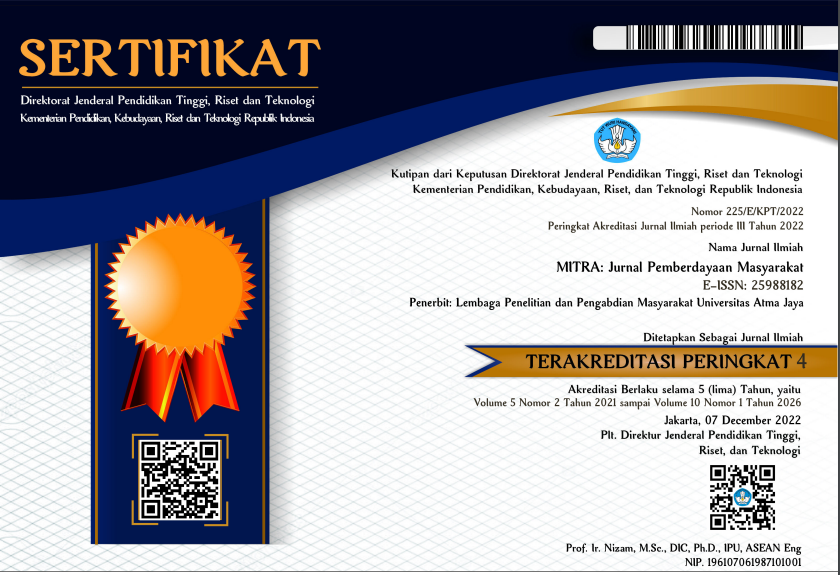Socializing Halal Certification Guidelines for MSMEs in Pucangan Village, Kartasura District, Sukoharjo Regency
DOI:
https://doi.org/10.25170/mitra.v5i1.2186Keywords:
LPPOM MUI, halal certification, MSMEsAbstract
The halal certification is important to ensure the public and business owners regarding halal products. However, the implementation of the halal certification program has faced some problems, such as the lack of facilitation for Micro, Small, and Medium Enterprises (MSMEs) and the high cost of halal certification. This activity is to socialize the importance of halal certification and provide assistance regarding the procedures and documents required in obtaining the halal certification. This activity targets the MSMEs actors who have their businesses around the IAIN Surakarta College and was carried out by socializing halal certification to the participants. During the preparation phase, we examine the participants’ understanding of halal product assurance and looked for information about the procedures of obtaining halal certification from LPPOM MUI and BPJPH. Th socialization activity was carried out in one day at Gedung Pusat Pengembangan Bahasa IAIN Surakarta. The certification guidelines socialization was attended by MSMEs owners around the IAIN Surakarta College. Based on the pretest and posttest results and the enthusiasm of the participants during the question-answer session, we could conclude that the activity has met our goals. This activity will benefit the MSMEs owners around IAIN Surakarta College in developing halalan toyyiban products’ assurance.
References
BPS. (2012). Kewarganegaraan suku bangsa agama dan bahasa sehari-hari penduduk Indonesia. Jakarta: Badan Pusat Statistik.
Iain-surakarta.ac.id. (2021). Visi dan misi IAIN Surakarta. https://iainsurakarta.ac.id/profil-iain/visi-misi-dan-tujuan/. Diakses 3 April 2021.
LPPOM. (2020). SK LPPOM MUI tentang biaya analisa laboratorium. Jakarta: Lembaga Pengkajian Pangan, Obat-obatan dan Kosmetika Majelis Ulama Indonesia.
Maryati, T., Syarief, R., Hasbullah, R., Bisnis, M., Pascasarjana, S., Pertanian, F. T., & Pertanian, F. T. (2016). Analisis faktor kendala dalam pengajuan sertifikat halal. (Studi kasus pelaku usaha mikro, kecil, dan menengah makanan beku di Jabodetabek). Jurnal Ilmu Produksi dan Teknologi Hasil Peternakan, 04(3), 364–371.
Muhamad, M. (2020). Tantangan dan peluang penerapan kebijakan mandatory sertifikasi halal (Studi implementasi UU No. 33 Th. 2014 dan PP No. 31 Th. 2019). Jurnal Ilmu Ekonomi dan Bisnis Islam, 2(2), 1–26. https://doi.org/10.24239/jiebi.v2i2.29.1-26.
MUI. (2015). Pedoman pelaksanan tugas komisi hukum dan perundang-undangan Majelis Ulama Indonesia. Jakarta: Majelis Ulama Indonesia.
Praja, C. B. E., & Kurniaty, Y. (2017). Kendala dan upaya pemerintah dalam penerapan Undang - Undang Nomor 33 Tahun 2014 tentang Jaminan Produk Halal di Kota Magelang. The 6th University Research Colloquium 2017 Universitas Muhammadiyah Magelang, 547–552.
Prasetyo, A. D., Taufik, M., & Yahya, I. (2020). Sosialisasi kriteria sistem jaminan halal pada pedagang warung makan sekitar kampus IAIN Surakarta. Jurnal Penelitian dan Pengabdian kepada Masyarakat UNSIQ, 7(2), 143–148.
https://doi.org/10.32699/ppkm.v7i2.893.
Setiawan, S., & Mauluddi, H. A. (2019). Perilaku konsumen dalam membeli produk halal di Kota Bandung. At-Tijaroh: Jurnal Ilmu Manajemen dan Bisnis Islam, 5(2), 232–246. https://doi.org/10.24952/tijaroh.v5i2.1849.
Downloads
Published
Issue
Section
License
This license allows reusers to distribute, remix, adapt, and build upon the material in any medium or format for noncommercial purposes only, and only so long as attribution is given to the creator. If you remix, adapt, or build upon the material, you must license the modified material under identical terms.



_.jpeg)

.png)
2.png)
.png)
.png)



